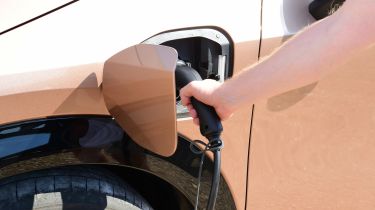Nissan Ariya review: range, battery & charging
Real-world range and rapid-charging speeds are both decent, but could be better
|
Model |
Range |
Wallbox charge time |
Rapid charge time |
|
63kWh FWD |
250 miles |
10hrs (0-100%, 7.4kW) |
31mins (10-80%, 130kW) |
|
87kWh FWD |
329 miles |
14hrs (0-100%, 7.4kW) |
35mins (10-80%, 130kW) |
|
87kWh 4WD |
309-319 miles |
14hrs (0-100%, 7.4kW) |
35mins (10-80%, 130kW) |
While there's a choice of two battery sizes for the Ariya (63 or 87kWh), which one you get depends on which powertrain you select. On the other hand, every model can reach charging speeds of up to 130kW, which aren’t quite the ultra-rapid capabilities of the Hyundai Ioniq 5 and Kia EV6, but on par with rivals from Skoda, VW and Toyota.
Nissan Ariya range
Entry-level Ariyas get a 63kWh battery paired with a 215bhp electric motor. The result is a claimed range of up to 250 miles. When we drove the car for this review, the 63kWh Ariya returned around 3.7 miles per kilowatt-hour efficiency. This equates to a real-world range of around 235 miles from a full battery, which is still impressive, especially without any concessions towards eco-focused driving.
But if you regularly need to tackle longer journeys, the Ariya is available with a larger 87kWh battery which boosts the official range up to 329 miles should you stick with front-wheel drive. You might not see that figure in the real-world, but based on our time in the bigger battery model driving through towns and some shorter jaunts on the motorway, we have no doubts it’ll cover over 300 miles on a charge.
Meanwhile, the all-wheel drive models have a slightly shorter range of 319 and 309 miles, depending on which power output you choose. Therefore, based on our experience with the other variants, you should be able to cover a little under 300 miles before the battery runs flat.
Charge time
All Ariyas are capable of 130kW rapid charging, which is a respectable speed, if not class-leading. However, Nissan is keen to emphasise that the car offers a ‘flat’ charging curve, with fewer peaks and troughs in speed over the course of a charging session. We still need to assess that for ourselves, but even so, Nissan says a 10-80% top-up will take just over half-an-hour for both battery sizes.
Fully replenishing the 64kWh battery in base model Ariyas will take around 10 hours from a 7.4kW home wallbox, while those with the larger 87kWh battery will need to be plugged in for 14 hours. However, when fitted with the 87kWh unit the Ariya also gets a 22kW on-board charger, which means if you find a suitably fast public charger or have one capable of those speeds installed at your house, a full recharge takes just under five hours.

